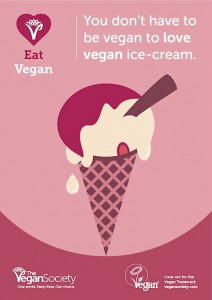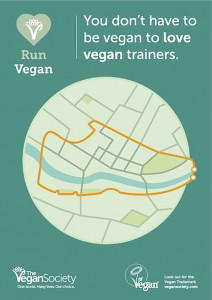Donald Watson, together with some others, founded The Vegan Society in 1944. Here my entry on Watson from the Cultural Encyclopedia of Vegetarianism:
WATSON, DONALD (1910–2005)
Born September 2, 1910, in Mexborough, South Yorkshire, England, Donald Watson coined the term “vegan” to describe individuals who abstain from the consumption and use of animal products and founded the Vegan Society to promote this idea. Watson spent much of his life as a woodworker or teaching woodwork. His father was a headmaster of a nearby school. His uncle and grandmother ran the family farm, and, at an early age, Watson, who had thought of the farm as an idyllic place, witnessed the slaughter of a pig. This began his reassessment of the human-nonhuman relationship, which continued through Watson’s adolescence.
In 1924, at age 14, Watson became a vegetarian. Twenty years later, in 1944, he founded the Vegan Society, although he had already been practicing a vegan diet
and lifestyle for a few years prior. “Vegan” comes from the beginning and ending letters of the word “vegetarian.” Watson thought that veganism was the logical conclusion of rejecting animal products for reasons of morality and health. He maintained that dairy products, such as milk, eggs, and cheese, were every bit as cruel and exploitive of sentient animal life as was slaughtering animals for their
flesh: “The unquestionable cruelty associated with the production of dairy produce has made it clear that lacto-vegetarianism is but a half-way house between flesh-eating and a truly humane, civilised diet, and we think, therefore, that during our life on earth we should try to evolve sufficiently to make the ‘full journey.’” He also avoided wearing leather, wool, or silk and used a fork, rather than a spade, in his gardening to avoid killing worms.
Watson was opposed to hunting, fishing, blood sports, and the use of animals in experiments or for testing purposes. Although he claimed to have respect for those who liberated animals from laboratories or engaged in other forms of direct action, he expressed concern that such activities were counterproductive. He was an advocate of organic farming and was critical of genetic modification of plants and animals.
Watson touted and exemplified the health benefits of a vegan diet, but he clearly saw veganism primarily as a moral principle. He regarded the vegan movement as “the greatest movement that ever was” because it provided a solution to the crisis of greed and violence that affected and afflicted humankind and that threatened ecological disaster. Although he was not religious in a traditional sense, he had deeply held spiritual beliefs that included the idea that being a carnivore violated natural law and that violence against nonhuman animals was a violation of spiritual laws that brought psychological unhappiness and ill health. Watson maintained that compassion was the only useful part of religion and that veganism involved practicing compassion.
Watson was committed to nonviolence in general. He had objector status during World War II. He lived an active and healthy life until his death in 2005 at age 95. Watson predicted, as did playwright George Bernard Shaw about his own funeral, that it would be attended by “all the spirits of all the animals” that Watson had never eaten.
Gary L. Francione
I hope that my profound respect for Watson, and his progressive vision, is apparent even from this brief entry.
I wrote this entry on Watson in 2010. In 2011, I was actually banned from the Vegan Society’s Forum because I was promoting veganism after I started a discussion you can read here.
And now, The Vegan Society has decided to “rebrand” itself through a campaign–You Don’t Have to Be Vegan–costing £6000. The Vegan Society has explicitly and deliberately abandoned veganism as a moral baselines in favor a most flexible version of flexible veganism that is described by The Vegan Society as “vegan consumerism.”
Here are three of its campaign posters:



In 1944, in the first newsletter of The Vegan Society, Donald Watson said this:
A common criticism is that the time in not yet ripe for our reform. Can time ever be ripe for any reform unless it is ripened by human determination? Did Wilberforce wait for the ‘ripening’ of time before he commenced his fight against slavery? Did Edwin Chadwick, Lord Shaftesbury, and Charles Kingsley wait for such a non-existent moment before trying to convince the great dead weight of public opinion that clean water and bathrooms would be an improvement? If they had declared their intention to poison everybody the opposition they met could hardly have been greater. There is an obvious danger in leaving the fulfilment of our ideals to posterity, for posterity may not have our ideals. Evolution can be retrogressive as well as progressive, indeed there seems always to be a strong gravitation the wrong way unless existing standards are guarded and new visions honoured.
In 2014, Jasmijn de Boo, CEO of The Vegan Society says:
Developed after a long period of research and meaningful dialogue, the campaign shows that we have really been listening to the views of vegetarians and meat eaters. Some people can make the jump to veganism overnight, but we understand that for others, the “Go vegan. Now!” messages are lost.
As if the choice were between a simplistic slogan, “Go vegan. Now!” and abandoning veganism as a moral baseline through promoting flexible veganism and “vegan consumerism.”
CEO de Boo continues:
Everyone is now free to embrace veganism, not only those who are already vegan, but those who are thinking about it and want to start bringing more plant-based dishes into their diet, or replace their leather shoes with vegan versions. Vegans can choose from a wide range of different food and products in supermarkets and online. It’s never been easier, in fact.
We are not here to tell people what to do or how to live. We are giving people the choice and the chance to join us. We are here to support anyone moving towards a more ethical and sustainable lifestyle. It’s not all-or-nothing. It’s about starting a conversation, or planting a seed.
A moment of silence for Donald Watson. That is the least we can do for someone whose vision has been abandoned and betrayed.
**********
If you are not vegan, please go vegan. Veganism is about nonviolence. First and foremost, it’s about nonviolence to other sentient beings. But it’s also about nonviolence to the earth and nonviolence to yourself.
The World is Vegan! If you want it.
Gary L. Francione
Board of Governors Distinguished Professor, Rutgers University
©2014 Gary L. Francione
And Ruth Semple, Head of Communications, Public Policy, and Research for The Vegan Society says:
The post A Moment of Silence for Donald Watson, Founder of The Vegan Society appeared first on Animal Rights: The Abolitionist Approach.
Related posts:
I Wonder What Donald Watson, Founder of the Vegan Society, Would Think
Source Materials on Donald Watson
Message to The Vegan Society: It’s About Justice
Banned by The Vegan Society for Promoting Veganism!
Some Thoughts on the Meaning of “Vegan”